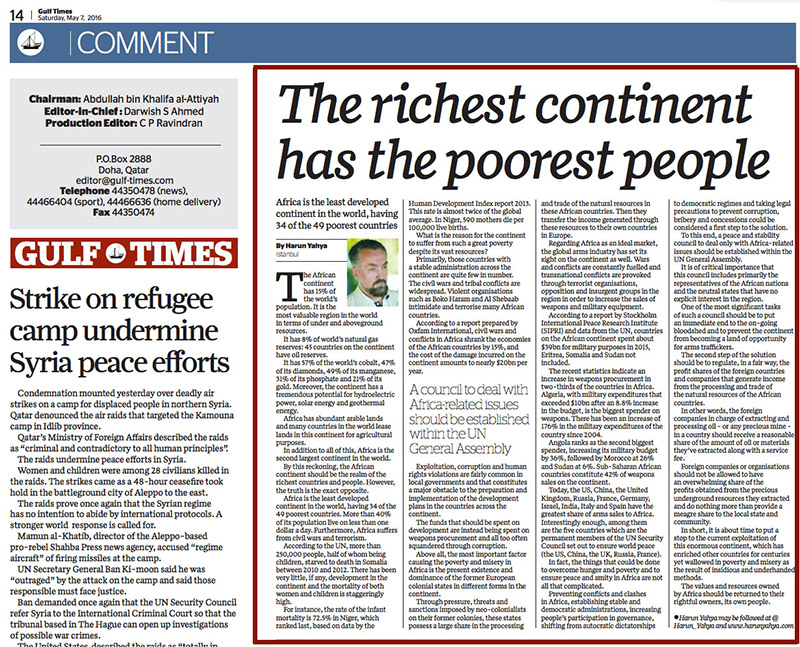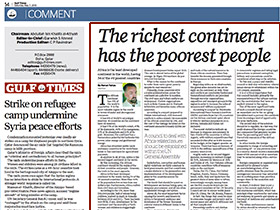
The African continent has 15% of the world’s population. It is the most valuable region in the world in terms of under and aboveground resources.
It has 8% of world’s natural gas reserves: 45 countries on the continent have oil reserves.
It has 57% of the world’s cobalt, 47% of its diamonds, 49% of its manganese, 31% of its phosphate and 21% of its gold. Moreover, the continent has a tremendous potential for hydroelectric power, solar energy and geothermal energy.
Africa has abundant arable lands and many countries in the world lease lands in this continent for agricultural purposes.
In addition to all of this, Africa is the second largest continent in the world.
By this reckoning, the African continent should be the realm of the richest countries and people. However, the truth is the exact opposite.
Africa is the least developed continent in the world, having 34 of the 49 poorest countries. More than 40% of its population live on less than one dollar a day. Furthermore, Africa suffers from civil wars and terrorism.
According to the UN, more than 250,000 people, half of whom being children, starved to death in Somalia between 2010 and 2012. There has been very little, if any, development in the continent and the mortality of both women and children is staggeringly high.
For instance, the rate of the infant mortality is 72.5% in Niger, which ranked last, based on data by the Human Development Index report 2013. This rate is almost twice of the global average. In Niger, 590 mothers die per 100,000 live births.
What is the reason for the continent to suffer from such a great poverty despite its vast resources?
Primarily, those countries with a stable administration across the continent are quite few in number. The civil wars and tribal conflicts are widespread. Violent organisations such as Boko Haram and Al Shebaab intimidate and terrorise many African countries.
According to a report prepared by Oxfam International, civil wars and conflicts in Africa shrank the economies of the African countries by 15%, and the cost of the damage incurred on the continent amounts to nearly $20bn per year.
Exploitation, corruption and human rights violations are fairly common in local governments and that constitutes a major obstacle to the preparation and implementation of the development plans in the countries across the continent.
The funds that should be spent on development are instead being spent on weapons procurement and all too often squandered through corruption.
Above all, the most important factor causing the poverty and misery in Africa is the present existence and dominance of the former European colonial states in different forms in the continent.
Through pressure, threats and sanctions imposed by neo-colonialists on their former colonies, these states possess a large share in the processing and trade of the natural resources in these African countries. Then they transfer the income generated through these resources to their own countries in Europe.
Regarding Africa as an ideal market, the global arms industry has set its sight on the continent as well. Wars and conflicts are constantly fuelled and transnational conflicts are provoked through terrorist organisations, opposition and insurgent groups in the region in order to increase the sales of weapons and military equipment.
According to a report by Stockholm International Peace Research Institute (SIPRI) and data from the UN, countries on the African continent spent about $39bn for military purposes in 2015, Eritrea, Somalia and Sudan not included.
The recent statistics indicate an increase in weapons procurement in two-thirds of the countries in Africa. Algeria, with military expenditures that exceeded $10bn after an 8.8% increase in the budget, is the biggest spender on weapons. There has been an increase of 176% in the military expenditures of the country since 2004.
Angola ranks as the second biggest spender, increasing its military budget by 36%, followed by Morocco at 26% and Sudan at 6%. Sub-Saharan African countries constitute 42% of weapons sales on the continent.
Today, the US, China, the United Kingdom, Russia, France, Germany, Israel, India, Italy and Spain have the greatest share of arms sales to Africa. Interestingly enough, among them are the five countries which are the permanent members of the UN Security Council set out to ensure world peace (the US, China, the UK, Russia, France).
In fact, the things that could be done to overcome hunger and poverty and to ensure peace and amity in Africa are not all that complicated.
Preventing conflicts and clashes in Africa, establishing stable and democratic administrations, increasing people’s participation in governance, shifting from autocratic dictatorships to democratic regimes and taking legal precautions to prevent corruption, bribery and concessions could be considered a first step to the solution.
To this end, a peace and stability council to deal only with Africa-related issues should be established within the UN General Assembly.
It is of critical importance that this council includes primarily the representatives of the African nations and the neutral states that have no explicit interest in the region.
One of the most significant tasks of such a council should be to put an immediate end to the on-going bloodshed and to prevent the continent from becoming a land of opportunity for arms traffickers.
The second step of the solution should be to regulate, in a fair way, the profit shares of the foreign countries and companies that generate income from the processing and trade of the natural resources of the African countries.
In other words, the foreign companies in charge of extracting and processing oil - or any precious mine - in a country should receive a reasonable share of the amount of oil or materials they’ve extracted along with a service fee.
Foreign companies or organisations should not be allowed to have an overwhelming share of the profits obtained from the precious underground resources they extracted and do nothing more than provide a meagre share to the local state and community.
In short, it is about time to put a stop to the current exploitation of this enormous continent, which has enriched other countries for centuries yet wallowed in poverty and misery as the result of insidious and underhanded methods.
The values and resources owned by Africa should be returned to their rightful owners, its own people.
Adnan Oktar's piece in Gulf Times:
http://www.gulf-times.com/story/492519/The-richest-continent-has-the-poorest-people


